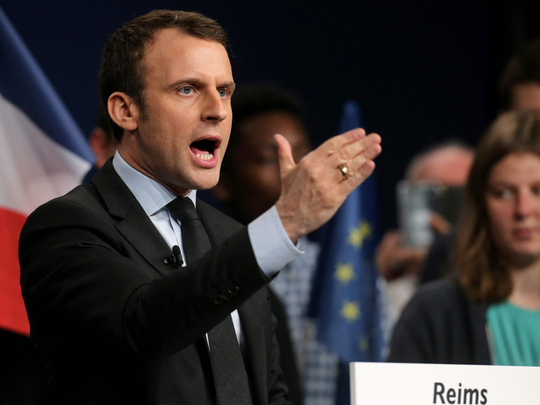
Emmanuel Macron’s appeal to France feels faintly ridiculous in translation. There’s the name of his sort-of party for a start: ‘En Marche!’, complete with exclamation mark. This emerges in English as ‘Working!’ or ‘Let’s Go!’ or ‘Forward!’ — an exhortation to ambiguous vacuity. The link ‘En Marche!’ creates between Macron the man and EM! the movement is lost entirely. What does ‘En Marche!’ mean? Partly, it means that Macron is seen in front of his own initials, 10 foot tall.
It’s hard not to be relieved that Ed Miliband only had François Hollande as inspiration. The Labour Party might now be called ‘Everyone Move!’ or some other nonsense. But it is through such staggering self-promotion that Macron makes his personality a movement — a home for voters longing for a politics unburdened by party history, sectional interest or past disappointments. When the other options are a neo-fascist; a family, faith and free-market traditionalist whose faith lies in the market value of his family; and a socialist incapable of beating either, then it is no surprise a lot of people will be looking for a cause worth believing in, even if there’s innovative punctuation involved.
Macron saw these people had no party, and offered himself as an alternative. The disconcerting egotism of this partyless leader was essential to his project. If he didn’t appear to believe wholeheartedly in his own brilliance, his vision, why should anyone else?
The symbolism and rhetoric of a different political culture rarely travel well. To impress his seriousness on the electorate, Macron gave a two-hour speech at a rally in Lyon last month. I doubt British political journalists would welcome imitators. His speeches contain enough passages of windy philosophising to make Jon Cruddas and Tristram Hunt blush. He is a banker and political adviser who wrote a book called Revolution and expected to be taken seriously. He’s apparently thought of as an outsider, an epithet rarely awarded to an economy minister appointed before their 40th birthday. Perhaps he’s France’s Alexander Hamilton?
If it isn’t obvious already, whatever Macron is, he isn’t that, or a French Tony Blair, or a centrist Alexis Tsipras. If I had to reach for a British comparison, based on his career, technocratic enthusiasms and liberal values, I’d pick Andrew Adonis, a politician equally raised up by patronage, equally unelected, equally of the centre-liberal-left metropolitan class, and equally distrusted by stalwarts of his old party. Adonis, however, appears somewhat unlikely to attract 8,000 people to a rally for himself. He’s far too self-effacing.
A British Macron seems an impossibility. Still, to a punch-drunk British centrist, stuck between Jeremy Corbyn and Nigel Farage with only Nick Clegg, Tony Blair and sundry figures of popular disdain as your champions, that someone who seems to share your values is actually popular, and more incredibly, may win an election is a powerful incentive to suspend both rationality and disbelief. Like losers in every era, we wonder if copying someone popular might make us popular too. We’re not alone in this tendency. Before Corbyn’s summer of adulation, the British left used to tell us that the future was Venezuelan, or Greek, or wherever placards and tear gas were colliding that week. The Ukip-ier parts of the right appear to see their platonic ideal embodied by a celebrity billionaire in a baseball cap.
Macron matters, not because he translates to English politics as well as he speaks the language, but simply because Macron appears to be winning, when moderate, pro-European, pro-immigration, fiscally cautious social liberals are generally as popular as medieval lepers, and have roughly the same electoral prospects. For that reason alone Macron’s rise does have lessons for the ragtag collection of downtrodden metropolitan elitists who make up Britain’s battered progressive minority.
These lessons are structural and symbolic, rather than philosophical. Macron’s success has been built on a casual disdain for party and tradition and loyalty, all concepts important to most people in politics. He has embraced a self-regard that verges on the ludicrous, and yet is being cheered, not laughed at. Why? For an idealist “trans-partisan” politician, he seems remarkably cynical in his self-promotion. Macron abandoned his patrons with a ruthless lack of gratitude as soon as they could no longer help him. He helped to end the prospects of a reformist Socialist candidate, Manuel Valls, by enthusing exactly the sort of voter Valls needed to win the Socialist primary.
Macron made himself a suspicious figure to the activists and unions of the left, and instead of compromising for the sake of unity and his friends, he embraced the disdain, knowing that he was placed to escape it, while his allies would be consumed by the anger of a party that felt betrayed. That ruthlessness would be horrific were it not accompanied by a sort of courage — the willingness to be disliked, a readiness to fight for unpopular causes that others duck — whether Europe, or immigration, or the good capitalism can and does do.
There will be no British Macron. Certainly no successful one. Our political culture, electoral system, party structures and parliament would never permit a career like his. There is perhaps a lesson though. In an era of populism, of personality, a politician of the centre must be seen to fight for their principles — especially the unpopular ones — or they will be assumed to have none.
In most cases, they will lose. Macron is lucky in his opponents, his timing and his looks. Still, in Britain at least, the centre is losing, and losing to opponents of the calibre of Corbyn and Farage and Liam Fox. The challenge Macron gives the retreating platoons of the British centre ground is simple — you’re losing. Why not fight, at least?
— Guardian News & Media Ltd
Hopi Sen is a former head of campaigns at the parliamentary Labour Party.







